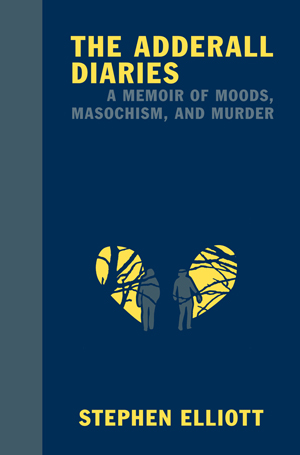
By Stephen Elliott
224 pages
Publisher: Graywolf Press, 2009
A memoir is a very elastic thing. There are memoirs of addiction, redemption, grief. There is the classic sort that presents the story of a person’s coming of age—the bildungsroman or story of an education, a coming into one’s own in society and as an individual. The Adderall Diaries is one of the genre-bending kinds of memoirs, an odd, pretzel-shaped kind, and the way it’s duct-taped together into a seamless whole is interesting on its own—leaving aside the involving story it contains, far stranger than most fiction.
The book spans a period in Elliot’s life when, as a struggling writer living in the Mission District in his early 30’s, he experiences a small dose of hard-won success and then promptly encounters writer’s block—the worst, most crippling and existential kind—and turns to drugs and crime for inspiration. The drug is Adderall, the powerful prescription speed he uses as medication and consolation, and the crime in question is a complex murder case involving a suspect Elliott knows from the Bay Area BDSM scene. It also involves, very likely at least, a false confession: one that has echoes deep in Elliott’s own history. As Elliott reports on developments in the court case, he follows his own investigation into the phenomena and personalities surrounding the crime, and the resonances in his own story, his family and his past.
There’s a compulsive quality to Stephen Elliott’s writing in The Adderall Diaries: both in its readability and the place it seems to have originated from. It’s easy to get hooked on it, hooked into the narrative, the need to tell and the need to understand becoming a linked obsession between the writer and the reader. There’s an ease, yet an immediacy and urgency about Elliott’s writing, that is very appealing. His most obvious gift is the way that he can humanize his subject—whether the subject is himself and his complicated relationships and his urges towards masochism, or the victims and suspects in a grisly murder, or a man (actually, there are two of them) who has confessed to a murder that they have not actually committed.
Transgression and confession—two sides of the same coin. Elliott is, in a pretty literal sense, a pro at dealing with violence; he seems to have confronted it, both in himself and in others, often enough that he has learned to live with it. He describes sadomasochism as a kind of extreme therapy, one that involves conscious risk of self-destruction but is, at its best, a healthier outlet for destructive emotions. His calm is contagious; the reader can enter into these worlds with him, get close to people and situations they’d otherwise consider at a distance, if at all.
When I was reading The Adderall Diaries, Dave Egger’s book A Heartbreaking Work of Staggering Genius came to mind. Elliott and Eggers both are deeply embedded in the Bay Area literary scene centered in the Mission District; they each are at the center of a constellation of publications and readings and happenings all related to words and writing and narrative. That may be where the similarity ends, though; the differences between them as writers are profound.
To me, perhaps the most interesting distinction is how they each portray the San Francisco Bay Area. Eggers paints it as a bright place full of youthful energy, feverish invention, potential for success, brash hope and optimism; for Elliott it is full of secrets and heartache, steep rents and marginalized bohemians, with subcurrents of violence and greed coexisting with the radical acceptance and honesty that he values. While A Heartbreaking Work embodies the spirit of San Francisco’s go-go, dot-com boom years, The Adderall Diaries captures the mood of the bust, the underbelly to all that hustling and dreaming.
Stephen Elliott seems to be one of those artists who creates obsessively. Which isn’t to say that it’s not still hard work for them, but that it’s like an itch they have to scratch, it’s something they’re driven to. It doesn’t necessarily make a great writer, but there are few that have lasted who haven’t had this quality. It’s the determination to tell a story, a certain quality that works its way into the voice.
The humanistic, steady gaze into sights that most avert their eyes from: it’s a very important thing for a writer to have. Stephen Elliott has it.







